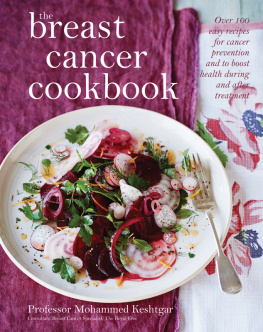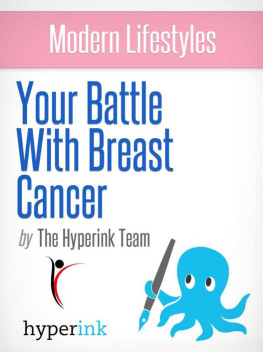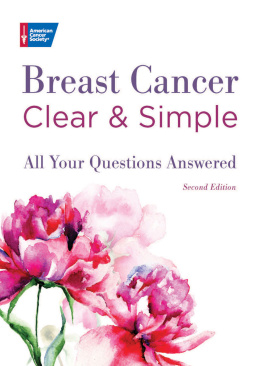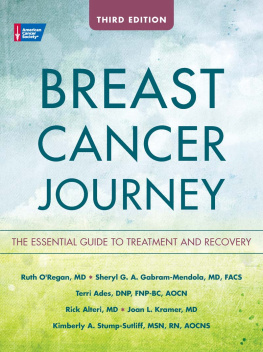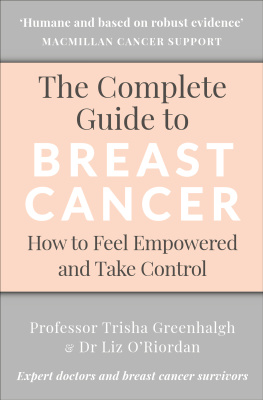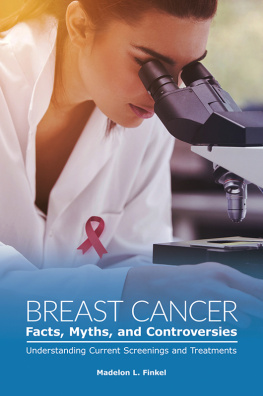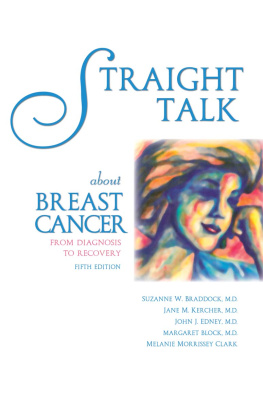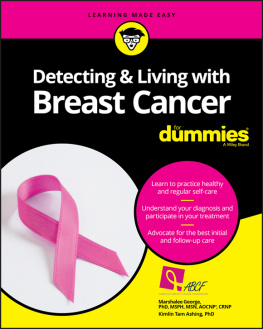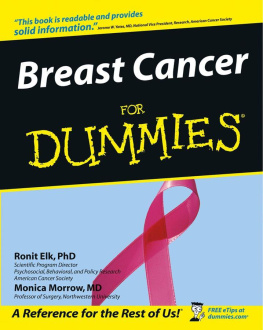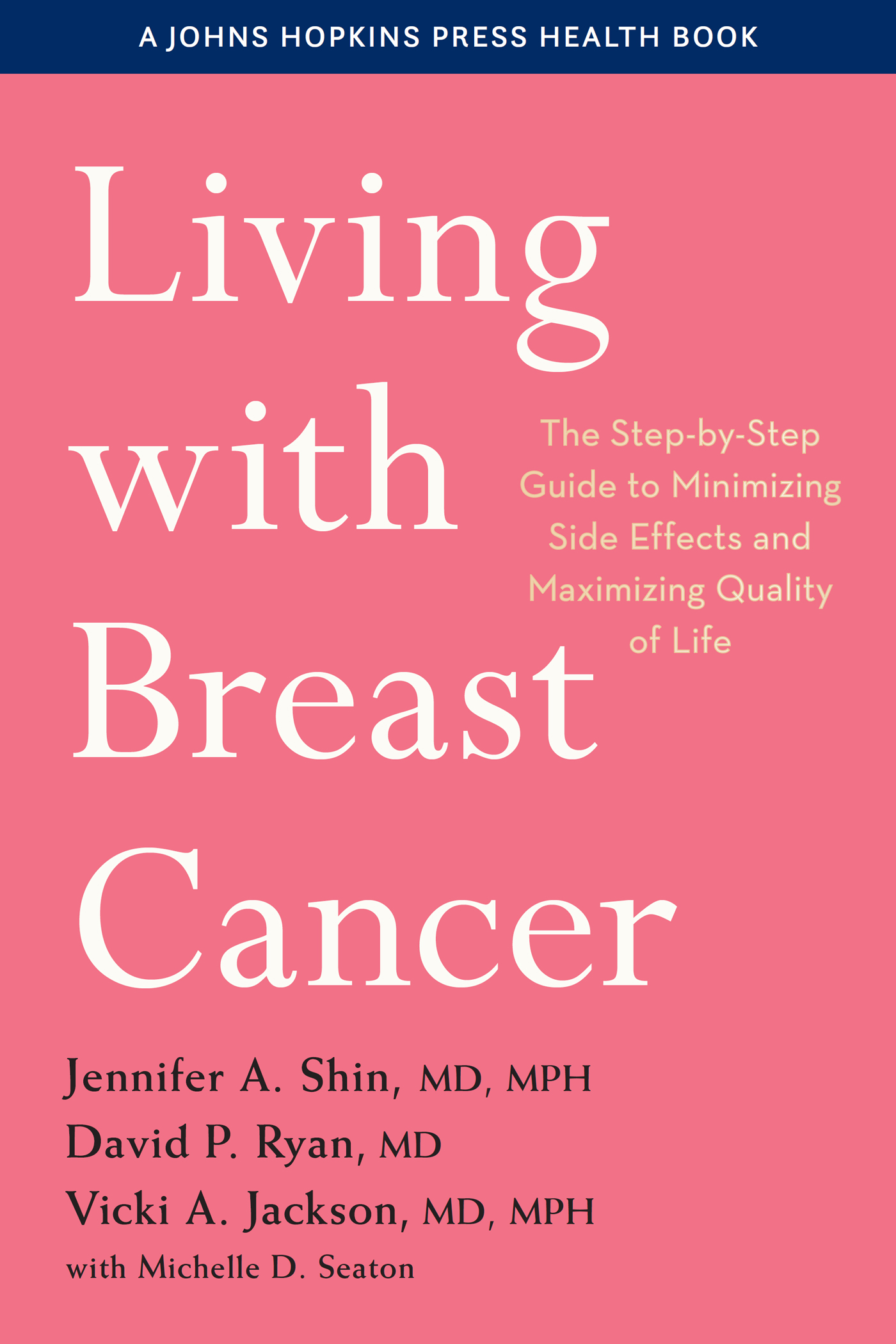Contents
Guide
Living with Breast Cancer
A Johns Hopkins Press Health Book
Living with Breast Cancer
The Step-by-Step Guide to Minimizing Side Effects and Maximizing Quality of Life
Jennifer A. Shin, MD, MPH
David P. Ryan, MD
Vicki A. Jackson, MD, MPH
with Michelle D. Seaton

Johns Hopkins University Press Baltimore
Note to the Reader: This book is not meant to substitute for medical care, and treatment should not be based solely on its contents. Instead, treatment must be developed in a dialogue between the individual and their physician. Our book has been written to help with that dialogue.
Drug dosage: The author and publisher have made reasonable efforts to determine that the selection of drugs discussed in this text conform to the practices of the general medical community. The medications described do not necessarily have specific approval by the US Food and Drug Administration for use in the diseases for which they are recommended. In view of ongoing research, changes in governmental regulation, and the constant flow of information relating to drug therapy and drug reactions, the reader is urged to check the package insert of each drug for any change in indications and dosage and for warnings and precautions. This is particularly important when the recommended agent is a new and/or infrequently used drug.
2022 Jennifer A. Shin, David P. Ryan, and Vicki A. Jackson
All rights reserved. Published 2022
Printed in the United States of America on acid-free paper
9 8 7 6 5 4 3 2 1
Johns Hopkins University Press
2715 North Charles Street
Baltimore, Maryland 21218-4363
www.press.jhu.edu
Library of Congress Cataloging-in-Publication Data
Names: Shin, Jennifer A., 1977 author. | Ryan, David P., 1966 author. | Jackson, Vicki A., 1968 author. | Seaton, Michelle D., author.
Title: Living with breast cancer : the step-by-step guide to minimizing side effects and maximizing quality of life / Jennifer A. Shin, MD, MPH, David P. Ryan, MD, Vicki A. Jackson, MD, MPH, with Michelle D. Seaton.
Identifiers: LCCN 2021055038 | ISBN 9781421444437 (paperback) | ISBN 9781421444444 (ebook)
Subjects: LCSH: BreastCancerPopular works. | BreastCancerPatientsCarePopular works. | BreastCancerPsychological aspectsPopular works. | BreastCancerPatientsLife skills guides.
Classification: LCC RC280.B8 S4935 2022 | DDC 616.99/449dc23/eng/20211207
LC record available at https://lccn.loc.gov/2021055038
A catalog record for this book is available from the British Library.
Special discounts are available for bulk purchases of this book. For more information, please contact Special Sales at specialsales@jh.edu.
PREFACE
Every cancer specialist has received phone calls from friends of friends who have a breast cancer diagnosis or are in treatment and who have many unanswered questions. These patients have all heard what the doctor said to them in clinicor thought they didbut afterward they often have trouble making sense of that information. This confusion is completely understandable. There are few things more disorienting than hearing the words, You have cancer. Every phase of treatment can seem equally disorienting as the person enters a new world filled with tests and scans and jargon. Patients are often at a loss about how to ask the right questions of their oncologists and nurse practitioners about the treatments they undergo. They struggle to talk in detail about their emotions and symptoms in a busy clinical setting.
In 2016, Dave Ryan and I wrote the book Living with Cancer: A Step-by-Step Guide for Coping Medically and Emotionally with a Serious Diagnosis. We hoped it would help people with any type of cancer cope with cancer treatments and the possible progression of cancer. It was meant as a sort of field guide to cancer care and we hoped that patients would use it to get their bearings in treatment and better communicate their needs and questions to their medical team.
Living with Cancer sprang from a novel integrated approach to cancer care at the oncology division at Massachusetts General Hospital. Patients with a serious diagnosis are offered the opportunity to meet with both an oncologist and a palliative care specialist. The oncologist can focus on tests and scans and treatments for the cancer, while the palliative care specialist with expertise in symptom management focuses on how you are living with the cancer and the treatments. Its like meeting with an additional practitioner, someone who is focused on how you are really doing both physically and emotionally living in this new cancer world.
That book was the product of more than 10 years of working with many of the same patients, answering their questions while also offering each other our different perspectives on patient care. In that time, we learned that its not easy to stay oriented in the complex world of cancer treatment. People often need to hear information more than once. They need strategies to help them live fully and take advantage of the days when they feel strongest. And they love hearing about how other patients have dealt with situations similar to theirs. That book was the result of all of that work with our patients. We wanted to create a guide for people to help answer their questions and empower them to ask many more questions of their own medical care team members.
After it was published, we heard from many patients who found the book extremely useful. We also heard from other patients who wanted a book that dealt only with breast cancer, because its a disease that affects more than 3 million women and thousands of men in the United States. Breast cancer is unique in that very shortly after diagnosis, a person has to learn a new vocabulary that describes their cancer cells. They may need to make decisions about the type of surgery to get and how to cope with a new body. They may also be hearing about various treatments, each with its own side effects. And although the success rate with breast cancer treatments offers a lot of hope, people may find themselves living with uncertainty about the future that lasts long after treatment ends. These are things that a palliative care perspective can help with.
Researchers have long documented the benefits of early integrated palliative care on people with a serious diagnosis, such as metastatic cancer. Quality of life is higher and rates of depression are lower. It reduces the burden of care on family members. It gives individuals the confidence to work with their medical teams to reduce symptoms and side effects of treatment, and it encourages them to live fully regardless of the prognosis. With all of that in mind, we wrote this book to describe how patients can take advantage of the palliative care perspective while in treatment for any stage of breast cancer.
To do this, Dave and I enlisted the help of Dr. Jennifer Shin, who is a palliative care specialist and a breast cancer oncologist with years of experience in both specialties. We also worked again with Michelle Seaton, a medical writer who helped craft our ideas into the book you hold now. Because of privacy concerns, the patient stories you read here are composites based on the many thousands of patients we have treated.
Living with Breast Cancer


